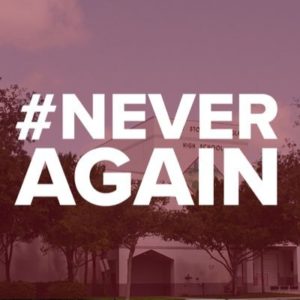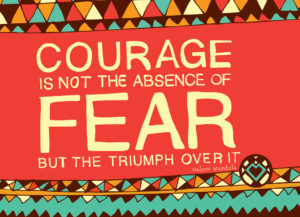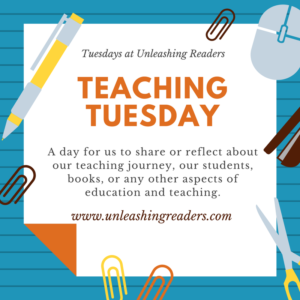For weeks I’ve known I wanted to write this post as tomorrow marks a month since the Parkland Shooting, but I had to figure out how I wanted to word all of my thoughts. I hope that I am able to articulate and say what I mean.
I love teaching. I love teaching so much that I asked to go back to part-time teaching even while I had to do a full-time reading coach job. Because teaching makes me happy and fills my heart. Part of my job as a teacher is my students being a part of my life and I, theirs. I am one of their adults. So many of us refer to our students as our kids because that is just what they are to us, our children.
The shooting in Parkland has put a lot of fear into our hearts. My fellow teachers are scared. My students are scared. And although there is so much I think should change, this is not a political post, so I am not going to get into the lack of mental health help and gun control laws in our country. I instead want to share what I discussed with students in the days after to help them process the fear.
First, I talk to them about it. Yes, I sit down with my students as if they are my peers to talk to them about this because I may be the only adult that does. I acknowledge the horror of what happened, and I answer any questions about it that they want to ask; however, I reiterate over and over that until something comes from a credible and reputable news source, we can’t assume it as true (this is an important lesson for kids period).
Then, I share with them how much I care about them and that I am always there for them. I make sure every single one of my students hear this. I want to remind them that I am one of their adults, and I am open to hearing them. I want to make sure if they have no one else to talk to that they know I am there. This is a multi-purpose. One, to help them process the mass shooting that happened only two hours from our house in a town that two of our teachers are from. Two, to make sure if any of my students feel outcast or that no one cares, they will hear that I do. Because I do.
That’s when we start talking about fear. Fear to me is a passive emotion. It is a chain reaction that leads to us being immobile and inactive and anxious. That is not what we need right now. Fear is what we’ve felt after Columbine. After Sandy Hook. After Virginia Tech. After too many school shootings. And nothing has happened because fear makes us immobile.
We also talked about media coverage and its impact on their fear. Without the constant coverage and social media postings, would they feel as fearful as they do? Probably not. They are a generation of constant connections, so it is our job as their adults to help them deal with the constant bombardment of information and how it affects them, so I felt it was important to talk about this as well.
Then, to help move past the fear I needed them to know that the tragedy is just that, a tragedy, and that it isn’t a norm. They brought up the 18 school shootings before Parkland in the U.S., so I talked to them about what those included, but then I asked them to guess how many car accidents there are every year. The answer? About 6.3 million accidents occurred in 2015, and over 37,000 people die in car accidents yearly in the U.S. (http://branlawfirm.com/many-car-accidents-usa-per-day/). But we are prepared because of this danger. We prepare appropriately by having air bags, wearing our seat belts, and making our cars safer. That is why we do lock down drills because until there is no threat, we need to be prepared, but that doesn’t mean we need to be scared. We are preparing for something that is very unlikely to happen. This part of the conversation is almost too logical which is why I made sure to talk about the emotional aspects first because I didn’t want to downplay the impossibly horrifying thing that happened in Parkland, but I also needed to help them get past the fear. Being scared isn’t a way to live, and if we are going to be scared of this, there is so much we’d need to be scared of also. Instead let’s be prepared and alert, yet live life to the fullest.
This is where I used the survivors as an example. Although I am sure that students who experienced the horrors that they did are definitely filled with fear, the ones we’re still hearing from have instead grabbed onto a more active emotion: anger. I am so proud of the productivity they have found in their anger and how they’ve made their voices be heard. If my students want to be angry, be angry. Just make sure it is a productive anger and an anger that doesn’t go away over time unless they feel that issues have been fixed.
And after that, classroom life goes on. Little things have changed: I now lock my door all the time again, more gates have gone up around my school, construction sounds make students jump, fire drills now are something everyone fears, and I am consciously smiling and saying hi to all students I see to make sure they hear a positive voice that day. But overall, classroom life goes on. However, I hope that the anger that my students feel, and so many teachers and students feel, leads to productive changes in our society and that this mass school shooting doesn’t lead to immobility, anxiety, and inactivity like the ones in the past.
**See my my other post on my school’s solidarity with Parkland to see my school’s walkout**




You are a wise and loving teacher, Kellee. I’m sure your students appreciate the frank discussions, your openness to discussing what others shy away from. I am sorry that this is happening, has happened too, too often. I was away with my students on a long trip when Columbine happened here in Denver. We talked long into the night when we teachers told them. Talking, sharing fears, listening is what matters, what we can do to ease the feelings. I’m glad you wrote, hope other teachers read and share.
Your love for your students comes through strong Kellee. I think that learning to evaluate information is not only an important lesson for kids, but for many adults also.